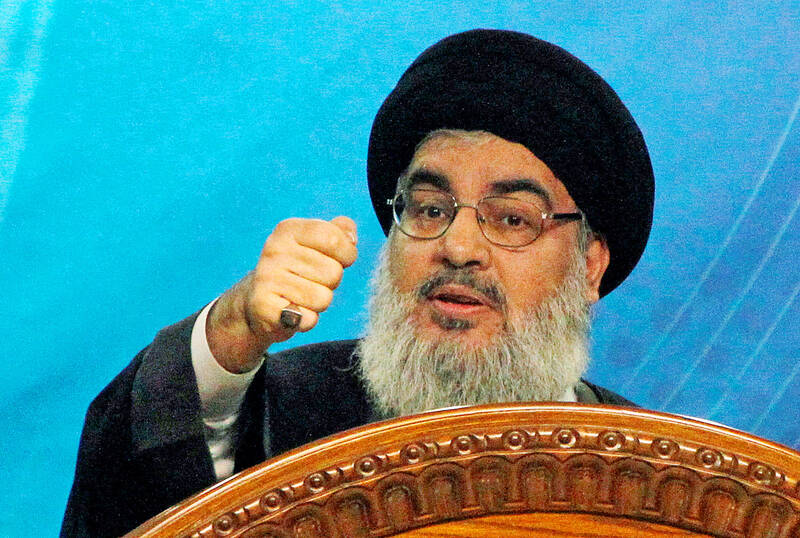Hezbollah leader Hassan Nasrallah has been killed, the Lebanese movement said yesterday, dealing a seismic blow to the Iran-backed group that has been engaged in a year of cross-border hostilities with Israel.
Hezbollah’s statement confirms earlier announcements from the Israeli military that they had killed Nasrallah in an air strike on Beirut’s southern suburbs, in a move that could destabilize Lebanon as a whole.
“Sayyed Hassan Nasrallah, Secretary General of Hezbollah, has joined his great, immortal martyr comrades whom he led for about 30 years,” Hezbollah said in a statement.

Photo: Reuters
Rarely seen in public, Nasrallah enjoyed cult status among his Shiite Muslim supporters and was the only man in Lebanon with the power to wage war or make peace.
Before his death was confirmed, a source close to Hezbollah said contact with the group’s leader had been “lost” since Friday night.
“Hassan Nasrallah is dead,” Israeli military spokesman Lieutenant Colonel Nadav Shoshani had announced earlier on X.
Another military spokesman, Captain David Avraham, said the Hezbollah chief had been “eliminated” in Friday night strikes on Beirut.
Iran’s supreme leader Ayatollah Ali Khamenei yesterday condemned what he called Israel’s “short-sighted” policy in the region.
“The massacre of the defenseless people in Lebanon once again ... proved the short-sighted and stupid policy of the leaders of the usurping regime,” Khamenei said in a statement, without mentioning Nasrallah’s fate.
Hezbollah began low-intensity cross-border attacks a day after its Palestinian ally Hamas staged its unprecedented attack on Israel on Oct. 7 last year.
Israel has over the past few days shifted the focus of its operation from Gaza to Lebanon, where heavy bombing has killed more than 700 people and displaced about 118,000.
“The message is simple, anyone who threatens the citizens of Israel — we will know how to reach them,” Israeli Chief of the General Staff Lieutenant General Herzi Halevi said yesterday.
Israel has raised the prospect of a ground operation against Hezbollah, prompting widespread international concern.
“We must avoid a regional war at all costs,” UN Secretary-General Antonio Guterres told world leaders, again appealing for a ceasefire.
The Lebanon violence has raised fears of a wider spillover, with Iran-backed militants across the Middle East vowing to keep fighting Israel.
Netanyahu addressed Iran in his UN General Assembly speech, saying: “I have a message for the tyrants of Tehran. If you strike us, we will strike you.”
“There is no place in Iran that the long arm of Israel cannot reach,” he said.

The Ministry of Foreign Affairs (MOFA) yesterday said it is closely monitoring developments in Venezuela, and would continue to cooperate with democratic allies and work together for regional and global security, stability, and prosperity. The remarks came after the US on Saturday launched a series of airstrikes in Venezuela and kidnapped Venezuelan President Nicolas Maduro, who was later flown to New York along with his wife. The pair face US charges related to drug trafficking and alleged cooperation with gangs designated as terrorist organizations. Maduro has denied the allegations. The ministry said that it is closely monitoring the political and economic situation

Conflict with Taiwan could leave China with “massive economic disruption, catastrophic military losses, significant social unrest, and devastating sanctions,” a US think tank said in a report released on Monday. The German Marshall Fund released a report titled If China Attacks Taiwan: The Consequences for China of “Minor Conflict” and “Major War” Scenarios. The report details the “massive” economic, military, social and international costs to China in the event of a minor conflict or major war with Taiwan, estimating that the Chinese People’s Liberation Army (PLA) could sustain losses of more than half of its active-duty ground forces, including 100,000 troops. Understanding Chinese

UNRELENTING: China attempted cyberattacks on Taiwan’s critical infrastructure 2.63 million times per day last year, up from 1.23 million in 2023, the NSB said China’s cyberarmy has long engaged in cyberattacks against Taiwan’s critical infrastructure, employing diverse and evolving tactics, the National Security Bureau (NSB) said yesterday, adding that cyberattacks on critical energy infrastructure last year increased 10-fold compared with the previous year. The NSB yesterday released a report titled Analysis on China’s Cyber Threats to Taiwan’s Critical Infrastructure in 2025, outlining the number of cyberattacks, major tactics and hacker groups. Taiwan’s national intelligence community identified a large number of cybersecurity incidents last year, the bureau said in a statement. China’s cyberarmy last year launched an average of 2.63 million intrusion attempts per day targeting Taiwan’s critical

‘SLICING METHOD’: In the event of a blockade, the China Coast Guard would intercept Taiwanese ships while its navy would seek to deter foreign intervention China’s military drills around Taiwan this week signaled potential strategies to cut the nation off from energy supplies and foreign military assistance, a US think tank report said. The Chinese People’s Liberation Army (PLA) conducted what it called “Justice Mission 2025” exercises from Monday to Tuesday in five maritime zones and airspace around Taiwan, calling them a warning to “Taiwanese independence” forces. In a report released on Wednesday, the Institute for the Study of War said the exercises effectively simulated blocking shipping routes to major port cities, including Kaohsiung, Keelung and Hualien. Taiwan would be highly vulnerable under such a blockade, because it